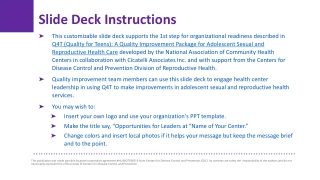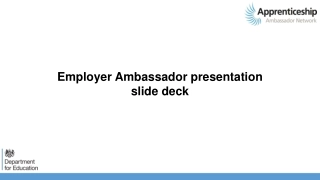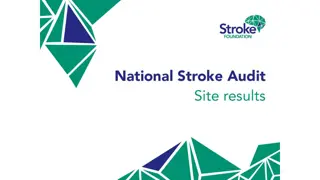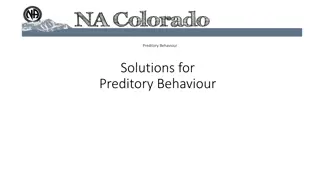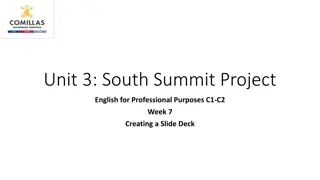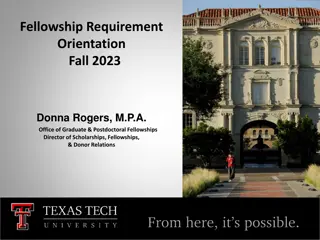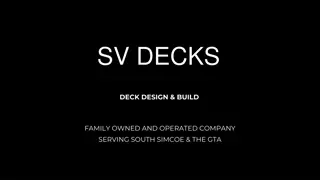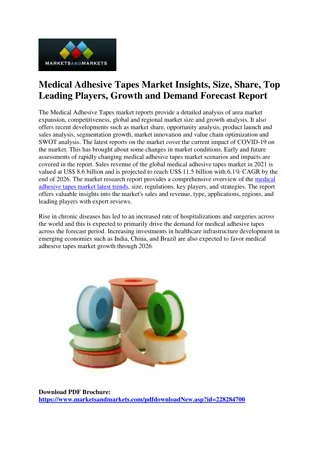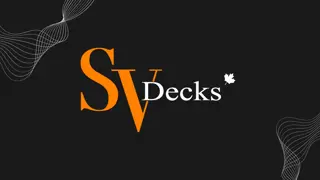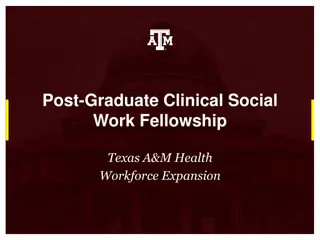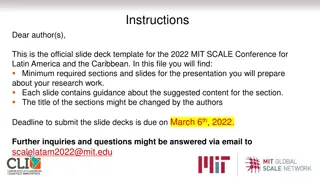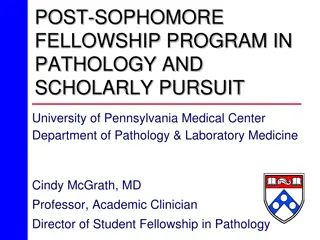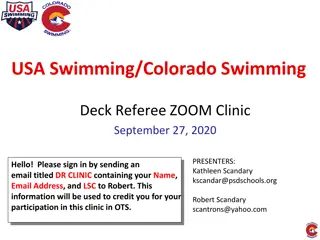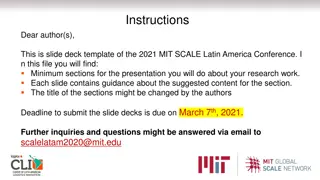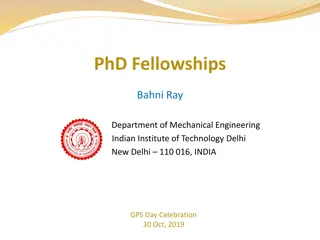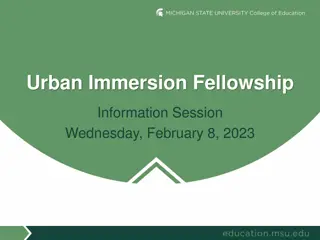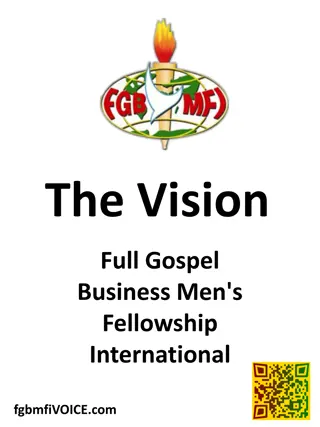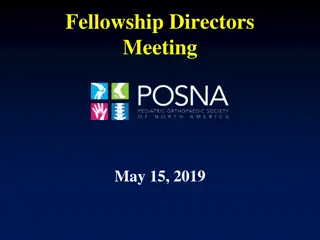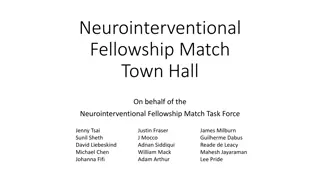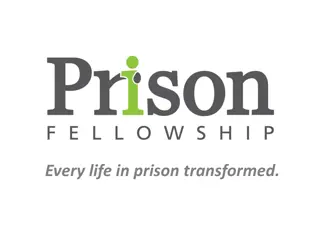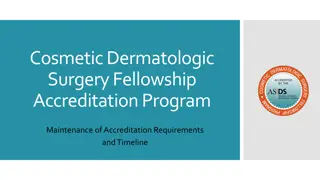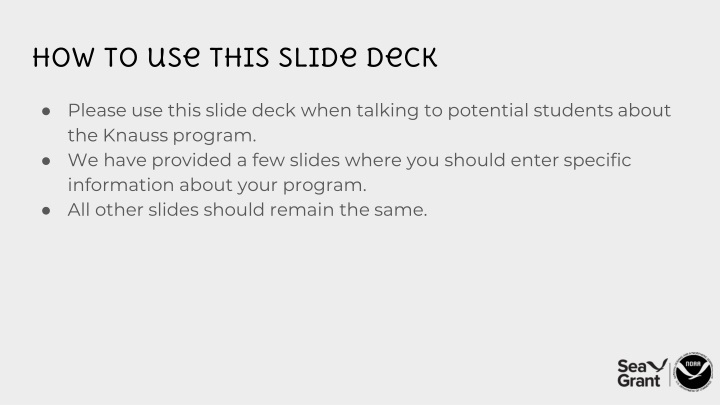
Sea Grant Knauss Fellowship Program 2026 - Empowering Future Leaders
The Sea Grant Knauss Fellowship Program 2026 offers graduate students a unique opportunity to engage in ocean, coastal, and Great Lakes resources while contributing to national policy decisions. Explore hands-on experiences, placements in branches of the Federal Government, and a comprehensive timeline for the fellowship class of 2026.
Uploaded on | 2 Views
Download Presentation

Please find below an Image/Link to download the presentation.
The content on the website is provided AS IS for your information and personal use only. It may not be sold, licensed, or shared on other websites without obtaining consent from the author. If you encounter any issues during the download, it is possible that the publisher has removed the file from their server.
You are allowed to download the files provided on this website for personal or commercial use, subject to the condition that they are used lawfully. All files are the property of their respective owners.
The content on the website is provided AS IS for your information and personal use only. It may not be sold, licensed, or shared on other websites without obtaining consent from the author.
E N D
Presentation Transcript
How to use this Slide Deck Please use this slide deck when talking to potential students about the Knauss program. We have provided a few slides where you should enter specific information about your program. All other slides should remain the same.
2026 Sea Grant Knauss Fellowship NATIONAL SEA GRANT CONTACT INFORMATION LOCAL SEA GRANT CONTACT INFORMATION PHONE: 240-507-3712 EMAIL: oar.sg.fellows@noaa.gov https://seagrant.noaa.gov/knauss PHONE: EMAIL:
Enhance the practical use and conservation of coastal, marine and Great Lakes resources to create a sustainable economy and environment SEA GRANT MISSION
Sea Grant: 34 University Based Programs
THE KNAUSS FELLOWSHIP ~1,500 The Sea Grant Knauss Fellowship provides a unique educational and professional experience to graduate students who have an interest in ocean, coastal and Great Lakes resources and in the national policy decisions affecting those resources. Alumni Launching illustrious careers, Sea Grant Knauss Fellowships offer direct experience working in the executive and legislative branches on the latest issues in ocean and coastal management, fisheries and research.
The Fellowship One-year hands on learning experience through a fully immersive work experience within the Washington DC region. Fellows should expect to be placed in the Executive or Legislative branches of the Federal Government. LEGISLATIVE BRANCH (makes the laws) Possible placements encompass committees and personal offices in both parties and chambers Many host offices have hosted fellows in the past and have a deep investment in the Sea Grant program Will typically work on the hot topic in the office, which may change throughout the year, and may not always be related to ocean/Great Lakes EXECUTIVE BRANCH (carries out the laws) Possible Host Agencies: NOAA, USFWS, USEPA, Navy, USGS, DOI, USCG, NSF Many host offices have hosted fellows and both mentors and colleagues are often alumni May work on very specific topics as an expert or serve in a high level coordination role
2026 Knauss Timeline National Review Timeline (2026 Fellowship Class) Month Activity December Opportunity goes live Student Applications due to the State Programs February 19, 2025 by 5:00 p.m. LOCAL TIME State Sea Grant programs review packages, check for minimum requirements, properly redact, interview applicants February Letters of Intent due to NSGO from state Program April 2, 2025 by 5:00 p.m. ET State Sea Grant programs nominate UP TO 6 applications each to the national competition April 16, 2025 by 11:59 ET NSGO review packages, check for minimum requirements, review redaction NSGO reviews Knauss Apps April Review panel webinar Paper Reviews Completed Present Selection Recommendations May FALD Notification Grants actions/program notification SG Programs Notified June Finalists notified
The Fellowship Award Placement in the Washington, DC area in the Legislative or Executive branch for 12 months Fellow Budget Breakdown Fellow Salary $73,100To be administered via grant to the host Sea Grant program; will cover fellow salary and individual professional development $5,000 BASE Fellow Professional Development Optional host office related travel funds; to be accepted as a one time release at the onset of the award Optional Office Related Travel $15,000 Additional Funds Funds administered only to legislative fellows that may be used for placement week expenses and fellowship related travel Legislative Travel Funds $2,500 AWARD DATES: February 1, 2026-February 28, 2027
State Level Award details Suggested information Is the fellow consider self employed? Will the fellow be provided benefits? Estimated take home pay Estimated time for reimbursements
Applicant Eligibility Any student, regardless of citizenship, is eligible to submit to this opportunity if: 1. The student is enrolled towards a degree in a graduate program (Masters, Ph.D. or J.D.); 2. The graduate degree will be awarded through an accredited institution of higher education in the United States or U.S. Territories, and; 3. The student has an interest in ocean, coastal, and Great Lakes resources and in the national policy decisions affecting those resources. Application submission is through an application to the Sea Grant program in the state in which the student is earning their degree. If there is no Sea Grant program will be assigned
Criteria that affect eligibility One year fellowship will take place in the National Capital region (DMV). Applicants must be prepared to relocate to the DMV. Non-U.S. citizens are responsible for obtaining the appropriate visa to allow them to work in the Washington, D.C. area during the fellowship period. Foreign nationals and dual citizens please note: while this fellowship is open to all eligible students regardless of nationality, a significant number of participating federal host offices are unable to accept foreign nationals as fellows. While more offices are able to host dual citizens, there may be restrictions. This may reduce the number of placement opportunities available to foreign nationals. Note: Foreign nationals are eligible for both the Executive and Legislative cohort. Applicants must be able to pass a federal background security check (includes arrest record, questions on drug use, and possible review of social media presence) Prior contact/arrangements made with possible host offices before the start of the placement week will be cause for immediate disqualification from the process. Applicants that have been accepted as National Finalists and/or become fellows are not eligible to apply again without the written permission of the NSGO Fellowships Manager, which will only be granted in response to exceptional life events. A national finalist is defined as an applicant who goes through the review process and is selected at the national level for the fellowship program. If alternates are selected, they are eligible for re-application if they withdraw prior to accepting a finalist position or are not offered a finalist position and would otherwise still be eligible to apply. Applicants are considered finalists until they are paired with a host office during the placement process.
Foreign national details Foreign nationals are eligible for both the Executive and Legislative cohort Non-U.S. Citizens are responsible for obtaining the appropriate Visa to allow them to work in the DMV Visa Types (most common) Student F1 Visa Graduate Optional Practical Training (OPT) Extension NOTE: A significant number of participating Federal hosts offices are unable to accept foreign nationals as fellows. This may reduce the number of placement opportunities available to foreign nationals. Due to security regulations, foreign nationals may have restricted access to federal systems and spaces. This includes escort throughout federal facilities
DUAL CITIZEN details Dual Citizens (US plus another) and permanent residents are eligible for both the Executive and Legislative cohort NOTE: A significant number of participating Federal hosts offices are unable to accept Dual Citizens as fellows. This may reduce the number of placement opportunities available to Dual Citizens.
Application Materials And Review Criteria
Application Materials Project Narrative TO BE SUBMITTED BY THE STUDENT (1) Curriculum vitae Section Once: Icebreaker Section Two: Career Path and Objectives (2) Personal Education and Career Development Response Section Three: Career Path Experience (3) Relevant Coursework and Future Year Plans (4) Letters of Recommendation TO BE SUBMITTED BY THE PROGRAM (5) Director Letter The following is a summary of the NOFO. Please refer to the student guide/NOFO for full text.
(1) curriculum vitae Curriculum Vitae Recommended Length Two Page (MAX) The student should not include personal contact information or web links to external resources (e.g., LinkedIn, articles, blogs, etc.). Notes Points 10 Points The CV does not adequately address the expectations outlined (0); the CV addresses the criterion in a poor or confusing way (1); the CV meets the criterion in an average or expected way (5); the CV meets the criterion in an exceptional way (10) Point Scale -The student has employment, volunteer, or extracurricular activities in academic, applied, research, administration, outreach, or policy positions; -The education and experience (personal and professional) in the student s area of expertise are appropriate to the career stage; -The applicant demonstrates academic, professional or personal experiences that are relevant and applicable to serving the American people; -The applicant s experiences show prior leadership roles relevant to their career stage (e.g., student government, faculty committees, advisory committees, professional societies, community initiatives, etc.). Review Criteria Pro Tip Utilize formating (bold, italics, indentations) to help provide a clear and concise CV. Submitted by the student
Career Development Response (2) Personal Education and Summary Table: Personal Education and Career Development Response The entirety of the Personal Education and Career Development Responses should not exceed 1,530 words. Each section and subsequent subsection should be answered separately using the section headers below. Section headers will NOT count as part of the overall word count. Recommended Length -The student should emphasize their abilities and expectations of the fellowship experience in terms of their career development. -Each section and subsequent subsection should be answered separately using the section headers below. Section headers will not count as part of the overall word count. -The student should NOT include personal contact information or web links to external resources (e.g., LinkedIn, articles, blogs, etc.). If included, programs should redact prior to submission. Notes -Read each section carefully and make sure to address the full question being asked. -Think beyond just academics, your life experiences (educational, professional and personal) make you the individual you are. -Do not repeat your CV, rather expand on it. Pro Tip Total Points 65 Points Submitted by the student
Career Development Response (2) Personal Education and Section One: Ice Breaker Label 1A 1B Recommende d Length 20 Words 5 Words MAX (strict word count) The student should list five adjectives that someone with a close personal connection (coworker, supervisor, etc.) would use to describe them. The student should use one sentence to describe themselves. Prompt Review Criteria -The student demonstrates creative thinking and a willingness to think outside the box. Points 5 Points The answer does not adequately address the expectations outlined (0); the answer addresses the criterion in a poor or confusing way (1); the answer meets the criterion in an average or expected way (3); the answer meets the criterion in an exceptional way (5). Point Scale Pro Tip Think outside the box and be creative! Actually ask someone who you trust to give you a few words. Submitted by the student
Section Two: Career Path and Objectives Career Development Response (2) Personal Education and Label 2A 2B 2C Recom mended Length The recommended word count for each prompt is 250 words. Each prompt should be answered separately using the section headers. Section headers will NOT count as part of the overall word count. The student should discuss any experience(s) (researcher or otherwise) that support or relate to the mission of the National Sea Grant College Program or the state Sea Grant program (the student does not have to have had a direct connection to Sea Grant). The student should emphasize (if relevant) any experience with extending and distilling science for non-scientific audiences. The student should discuss the transferable skills (skills that can be applied across a variety of disciplines) that they would bring to the Knauss Fellowship. In this response, students should highlight experiences from their personal, professional and academic background. The student should discuss their interest in the Knauss Fellowship with a specific focus on how the Knauss Fellowship supports the student s career pathway. The student should focus on how the Knauss Program would further support their development as a professional. Prompt -The student demonstrates an understanding of the Knauss Fellowship program; -the career path and objectives demonstrates the student s broad personal and professional background; -the student clearly articulates their career or professional goals; -the student is specific, direct, and concise while discussing what they would bring to and gain from the Knauss Fellowship. -The student clearly links experiences to the mission of Sea Grant (national or state); -the student demonstrates their ability to convey scientific knowledge in broader, non-scientific contexts; -the student demonstrates creative thinking, analytical skill, and/or indicates their capacity and willingness to make connections between science and broader economic, social, and political issues. -The skill set demonstrated will provide a foundation for success in the Knauss fellowship; -the student is specific, direct, and concise while discussing the skills they have cultivated throughout their career. Review Criteria Points 10 Points 10 Points 10 Points Point Scale The answer does not adequately address the expectations outlined below (0); the answer address the criterion in a poor or confusing way (1); the answer meets the criterion in an average or expected way (5); the answer meets the criterion in an exceptional way (10). Review the mission of both the National Sea Grant Program and the state through which you are applying. Be specific about why Knauss. If you are unsure, explore how Knauss will help define or guide your career. Pro Tip Tell us what you would bring to Knauss. Submitted by the student
Section Three: Career Path Experience Career Development Response (2) Personal Education and Label 3A 3B 3C Recom- mended Length The recommended word count for each prompt is 250 words. Each prompt should be answered separately using the section headers. Section headers will NOT count as part of the overall word count. The student should discuss a situation in which they overcame a challenge (e.g. within a community or institution, personally, professionally, etc.) specifically as it relates to how they took a leadership role. The student should also consider including a reflection on what they learned from this experience. During the Fellowship, finalists will serve in a range of capacities, including developing and delivering public programs or services, informing policy-making, and providing evidence-based advice to leaders. The student should discuss how they have and/or will embrace the concept of public service. The student should discuss a situation in which they have worked with a person or group with different perspectives, life experiences, beliefs, etc. from their own to achieve a common goal. The student is encouraged to use examples. Prompt -The student demonstrates creativity and willingness to navigate a challenging situation; -The student demonstrates leadership and problem solving initiative; -the student has shown interest in working with a variety of collaborators, community members and/or interested partners. -The student demonstrates an interest in contributing to public programs or service; -the student demonstrates experiences in public service, including, but not limited to volunteering, leadership, extension or education experiences. These do not have to be directly related to the mission of NOAA. -The student demonstrates creativity and willingness to navigate a challenging situation; -The student demonstrates leadership and problem solving initiative. Review Criteria Points 10 Points 10 Points 10 Points Point Scale The answer does not adequately address the expectations outlined below (0); the answer address the criterion in a poor or confusing way (1); the answer meets the criterion in an average or expected way (5); the answer meets the criterion in an exceptional way (10). Think about what the significance of public service means to you and what activities you have participated in that support that. Make sure to tell a story (no need for specificity details like names or institutions). Make sure to tell a story (no need for specificity details like names or institutions). Pro Tip Submitted by the student
future year plans (3) Relevant Coursework and Relevant Coursework and Future Year Plans Recommended Length One Page single spaced (MAX) The student should discuss any relevant coursework and their future year activities. -Relevant Coursework: The student may discuss any completed or in progress classes that they deem relevant to their success in the Knauss Fellowship Program. -Future year activities: The student should include a listing of classes and/or plans for spring 2025, summer 2025, and fall 2025. Section Description Points 10 Points The relevant coursework and future year plans does not adequately address the expectations outlined (0); the relevant coursework and future year plans addresses the criterion in a poor or confusing way (1); the relevant coursework and future year plans meets the criterion in an average or expected way (5); the relevant coursework and future year plans meets the criterion in an exceptional way (10). Point Scale -The student has activities in academic, applied, research, administration, outreach, or policy; -The future education and experience (personal or professional) support the student s goals or provide further experiences applicable to the Knauss Program. Review Criteria Provide explanation for why a class you have taken or activity in your future, applies to or supports the Knauss program. Pro Tip Submitted by the student
(4) Letters of Recommendation Letters of Recommendation (submitted by STUDENT) Recommended Length Two Pages single spaced (per letter) (MAX) Two letters of recommendation from individuals who have worked with the student, including at least one from a faculty member associated with the student s current enrollment who has knowledge of the student s academic and research (when applicable) performance. Each letter should not exceed two pages single spaced and should clearly indicate the letter writer s name and position. These letters should: (a) discuss the following attributes of the student: self-motivation, response to setbacks, skills and involvement in teamwork, collaborative leadership skills, willingness to learn a new skill or topic, academic performance and potential; and (b) speak to anything else the review panel should know about the strengths that the student will bring to the fellowship Section Description Points 5 Points (each) The LOR does not adequately address the expectations outlined (0); the LOR addresses the criterion in a poor or confusing way (1); the LOR meets the criterion in an average or expected way (3); the LOR meets the criterion in an exceptional way (5). Point Scale -The letter writers demonstrate knowledge of the student and their abilities; -The letter writers speak to the leadership potential, confidence, maturity, and self-direction of the student; -The letter writers provide evidence of the student s willingness and flexibility to tackle issues beyond their area of expertise and an openness and capacity to expand experiences; -The letter writers provide evidence of the student s ability to convey scientific knowledge in broader, non-scientific contexts Review Criteria Schedule an appointment or meeting with your letter writers well in advance. Discuss the program to which you are applying, the selection criteria, and highlight your most relevant professional experiences. Make this process as easy for the writers as possible! Pro Tip Submitted by the student
(5) Directors Letter Sea Grant Director's Letter Recommended Length Two Pages single spaced (MAX) A signed letter of recommendation from the state Sea Grant director, which is built from an interview with the applicant. The letter should not exceed two pages single spaced. As part of that interview and subsequent letter, the director shall: (a) demonstrate why the student aligns with the goals of the Knauss program; (b) highlight the skills the student emphasizes in the interview; and (c) explain any gaps in the CV or personal education and career development response or anything that the student feels they were unable to include in the application that they feel is important for the review panel to know. Section Description Points 5 Points The LOR does not adequately address the expectations outlined (0); the LOR addresses the criterion in a poor or confusing way (1); the LOR meets the criterion in an average or expected way (3); the LOR meets the criterion in an exceptional way (5). Point Scale -The director s letter demonstrates how the student fits with the Knauss Program, including any discussion of why the student belongs in the Knauss Program; -Highlights the skills (academic, professional or personal) that the student would bring to the Knauss program; -Elaborates on information not specifically addressed by the student in their application package Review Criteria Pro Tip Be true to yourself in your interview with the director. Submitted by the program
Review Criteria Evaluation Criteria Evaluation Criteria Section Points (1) Curriculum vitae 10 Points Section Once: Icebreaker 5 Points Prompt A 10 Points Prompt B 10 Points (2) Personal Education and Career Development Response Personal Education and Career Development Response Section Two: Career Path and Objectives Prompt C 10 Points Prompt A 10 Points Prompt B 10 Points Section Three: Career Path Experience Prompt C 10 Points (3) Relevant Coursework and Future Year Plans 10 Points Institution Letter of Recommendation 5 Points (4) Recommendations and/or endorsements Secondary Letter of Recommendation 5 Points Director Letter 5 Points All aspects of the application materials (CV, Personal education and career development responses, relevant coursework and future year plans, letters of recommendation and directors letter) (5) Overall Application Cohesion 10 Points
Transcripts Out of State Letter If applicable, for applicants in a state or territory not served by an eligible Sea Grant program, but applying through an eligible Sea Grant program, a written statement from the Sea Grant Knauss Fellowship Program Manager referring the applicant to the most appropriate eligible Sea Grant program must be included as part of that applicant's application package to the Sea Grant program. Clear digital or scanned copies of all undergraduate and graduate student transcripts (unofficial are acceptable). *NOT SCORED *NOT SCORED Students should be prepared to provide for state level review
Optional Demographics Information Through the Sea Grant Knauss Fellowship we strive to provide an educational and employment opportunity for current and recent graduate students interested in ocean, coastal and Great Lakes resources and the national policy decisions affecting those resources. Students have the option to provide demographic information via this OMB approved FORM. The information and associated background information of graduate students, as well as recent graduates, which may be used for the purpose of tracking scholarship recipients' academic progress, making annual financial awards, and tracking graduate studies and career progress. This information will not be used to determine program eligibility. Data will be confidential and not part of the review process.
State Level Review Add information about what the applicant can expect. Consider including a timeline
National Level Review National Review Timeline (2026 Fellowship Class) Month Activity December Opportunity goes live Student Applications due to the State Programs February 19, 2025 by 5:00 p.m. LOCAL TIME State Sea Grant programs review packages, check for minimum requirements, properly redact, interview applicants February Letters of Intent due to NSGO from state Program April 2, 2025 by 5:00 p.m. ET State Sea Grant programs nominate UP TO 6 applications each to the national competition April 16, 2025 by 11:59 ET NSGO review packages, check for minimum requirements, review redaction NSGO reviews Knauss Apps April Review panel webinar Paper Reviews Completed Present Selection Recommendations May FALD Notification Grants actions/program notification SG Programs Notified June Finalists notified
Application Tips Request that you be connected to an alumni (or two) that may be able to answer your questions about the program Have a coaching session or conversation about your application materials Re-read: The application requirements and your application materials. Letters of rec: Prep your letter writers about the opportunity. Give them time to provide meaningful comment about you. Start early: Collecting all the pieces can take time! Stay true to yourself, this is your application, let your character and goals be the focus! PROOFREAD
Programmatic Considerations The Knauss Fellowship is a DC based fellowship. All selected fellows must have the ability to move to the DC region. Some offices do allow telework, however, this is not a guarantee, rather a privilege. Most positions require a public trust clearance, some require a secret clearance. Fellows will be asked detailed questions about personal history. An example of a security background form can be found HERE. Please note, that federal laws supersede state laws. The Knauss Fellowship is an extension of a student s education. The program expects participants to participate in a professional development program as well as complete all mandatory reporting requirements. The Direct Hire is a PERK of the program. Receiving the Direct Hire Authority is incumbent on the successful completion of the fellowship - which includes, but is not limited to, completing 10 full months of the program, maintaining good standing with the host office and the participation in programmatic professional development activities. The Knauss Fellowship is administered through the state program, all student applicants should be made aware of the anticipated salary, benefits, etc. that the program will be providing. Having access to materials from previous Knauss applications can be useful, however, students should refrain from copying materials directly. Shared application materials can be a useful reference. The NSGO recommends that students have coaching sessions or conversations with previous fellows, rather than relying on materials alone.
QUESTIONS? NATIONAL SEA GRANT CONTACT INFORMATION LOCAL SEA GRANT CONTACT INFORMATION PHONE: 240-507-3712 EMAIL: oar.sg.fellows@noaa.gov https://seagrant.noaa.gov/knauss PHONE: EMAIL:

